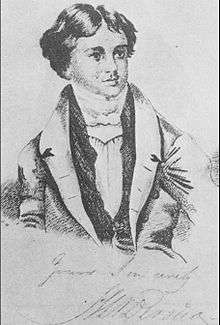To India - My Native Land
To India - My Native Land is a poem by Indian poet Henry Louis Vivian Derozio, published in 1828 as part of his book The Fakeer of Jungheera: A Metrical Tale and Other Poems. It is one of the most notable works by the Indian poet.
| by Henry Louis Vivian Derozio | |
 | |
| Written | 1828 |
|---|---|
| First published in | India |
| Country | India |
| Language | English |
| Subject(s) | British rule |
| Form | Petrarchan sonnet |
| Meter | Iambic pentameter |
| Rhyme scheme | ABABABCC DEDEFF |
| Publisher | Evergreen Publications (India) Limited |
| Media type | |
| Lines | 14 |
| Pages | 1 |
The poet was very pained at the fact that India was under British rule and laments that fact in this poem.[1]
Summary
My country! in thy day of glory past
A beauteous halo circled round thy brow,
And worshipped as a deity thou wast—
Where is that glory, where that reverence now?
Thy eagle pinion is chained down at last,
And grovelling in the lowly dust art thou:
Thy minstrel hath no wreath to weave for thee
Save the sad story of thy misery!—
Well–let me dive into the depths of time,
And bring from out the ages that have rolled
A few small fragments of those wrecks sublime,
Which human eyes may never more behold;
And let the guerdon of my labour be
My fallen country! one kind wish for thee!
The poet expresses a sense of personal loss in the downfall of his country, India. Addressing India, the poet says that in the old days, India was worshipped like a deity. He wonders where that glory and splendour has disappeared and regrets the fact that his motherland has now been reduced to the position of a slave of the British Empire. The poet also mentions that the country has been humiliated and ashamed of herself grovelling in the dust. There was time when the country soared like an eagle in the skies but now the wings of that great bird have been clipped and it is chained. The poet has no wreath of flowers to offer the country but instead, he will dig into the past and will try to sing of some parts of that great history which is no longer available to the younger generation. The only reward author wants for his effort is that the country should have a kind wish for the author and the countrymen should love him. The author says that his last wish to all the Indians is to dive deep into the past and bring back the lost glory of India
Major themes
The theme is mainly patriotism. Henry Louis Vivian Derozio talks of the past glory of India and how the country that was called the "Golden Bird" has been chained and enslaved. He proposes to write about some of that heritage of the distant past and in return hopes for a kind wish from the country and its people.[2]
The poet has used the image of a golden bird, thus hinting at the past glory of India. Words like "halo", "deity", "worship" elevate the country to a height and then words such as "chained", "grovelling", "lowly dust" bring out the contrast strongly. The misery and lament of the poet invite readers to join his sorrow.
Style
The poem is a Petrarchan sonnet with a rhyme scheme of ABABABCC DEDEFF. The poem shows influences of Romantic poets.
References
- M. K. Naik (1984). Perspectives on Indian Poetry in English. Abhinav Publications. pp. 1–. ISBN 978-0-391-03286-6. Retrieved 22 June 2012.
- Indispensable THE GOLDEN LYRE, By Mr. Usha Nagpal, National Publication house and did like himself , p-117